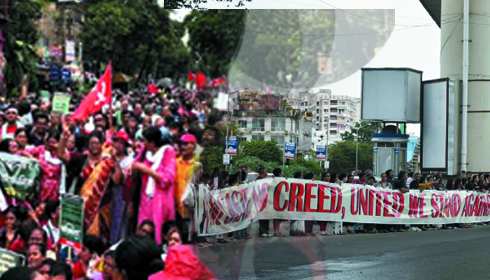
Nation Witnesses an Extraordinary Moment of Solidarity: 17-Km Human Chain Calls for Justice in RG Kar Case
On Tuesday, the nation witnessed an astonishing moment when, in response to the request of junior physicians in Kolkata, individuals from all walks of life formed a spectacular 17-kilometre-long human chain. This unusual show of unity was a dramatic response to the terrible rape and murder of a medical student at RG Kar Medical College, which sent shockwaves throughout West Bengal and beyond.
The human chain, which stretched from Patuli to Ultadanga along the EM Bypass, was more than a protest; it represented collective grief, fury, and an unshakeable desire for justice. The chain, which comprised both medical professionals and ordinary citizens, revealed the extent of popular support for the 'Justice for RG Kar' campaign. Numerous groups of doctors, nurses, paramedics, and even sports fans from Kolkata's well-known football clubs—Mohun Bagan, East Bengal, and Mohammedan—sponsored this spontaneous, grassroots effort instead of a planned event.
The sheer size of the demonstration, with tens of thousands of people attending, demonstrated the incident's tremendous influence on public consciousness. The fact that traffic remained largely unaffected despite the participants' 17-kilometre march demonstrates the disciplined and peaceful nature of the protest, as well as the seriousness with which the participants approached this manifestation of solidarity.
Since the tragic events of August 9, when the crime first became public, West Bengal has seen a boom of protest activities, each more determined than the last. The protests have been characterised by a sense of urgency and determination, with new forms of activism emerging practically every day. The human chain, while impressive, is merely the latest in a string of unusual public demonstrations. Earlier on August 14, numerous districts and subdivisions held a 'Girls' Night Occupation' program, emphasising the broad call for justice.
Junior doctors' engagement in these protests has been particularly significant. Their sit-in outside the Lalbazar police headquarters, which ended with a meeting with Police Commissioner Vineet Goyal after 23 hours, was a huge step forward in their demand for accountability. The parents of the slain student, who called the meeting a "moral victory," have been outspoken in their support for the protests, despite their dissatisfaction with the glacial pace of justice.
The significance of these protests cannot be overemphasized. They represent a rising dissatisfaction with systemic concerns in the state's healthcare system, particularly those concerning corruption and safety. The Central Bureau of Investigation (CBI) has arrested Sandip Ghosh, the former principal of RG Kar Medical College, igniting calls for accountability and prompting questions about the delay in taking action.
Parallel to the protests by medical professionals, the Left Front has also mobilised in response to the RG Kar case. Their gathering at the Shyambazar Panchamathar intersection on Tuesday, which resulted in considerable traffic jams, was another obvious indication of the broad desire for justice. The Left's engagement, which includes preparations for additional rallies, demonstrates that this issue has garnered support from across the ideological spectrum.
Throughout these developments, the victim's family has remained staunch in their pursuit of justice. Their decision to submit letters to the country's highest offices, including the president and prime minister, demonstrates the urgency of the problem. They have also expressed worries about the state's treatment of corruption within the medical school, specifically the prolonged suspension of Sandip Ghosh.
The development of the 17-kilometre human chain exemplifies the incredible potential of collective action. It expresses the people of West Bengal's tremendous sense of grief and indignation, as well as their commitment to see justice served. The nation will undoubtedly remember Tuesday's demonstration of solidarity and resolution as a watershed moment in the ongoing push for accountability and reform in the state's healthcare system.